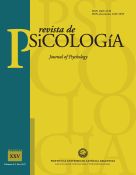Mischel's Marshmallow experiment analyzed from the neo-conductist and psychoanalistic theories
Keywords:
Delay of gratification, Selfcontrol, Impulse, Pleasure principleAbstract
The Marshmallow Experiment done by Mischel since 1957, was intended to analyze delay of gratification in children. Mischel considered that kids that can achieve the ability to delay gratification, are those who can achieve better academic and social results. On the other hand Freud propose the theory that children can not achieve this goal. Mischel, taking into account different investigations, thought that he was questioning Freud´s theory of impulse control in children. However, the different tests results made by himself show that 70% of the children could not delay gratification, while only 30% could. As a result, Mischel´s investigations seem to confirm and not question Freud´s ideas.Downloads
Download data is not yet available.
Downloads
Published
04/12/2018
How to Cite
Brenlla, M. E., & Germano, G. (2018). Mischel’s Marshmallow experiment analyzed from the neo-conductist and psychoanalistic theories. Revista De Psicología, 13(25), 7–21. Retrieved from http://200.16.86.39/index.php/RPSI/article/view/1058
Issue
Section
Articles
License














